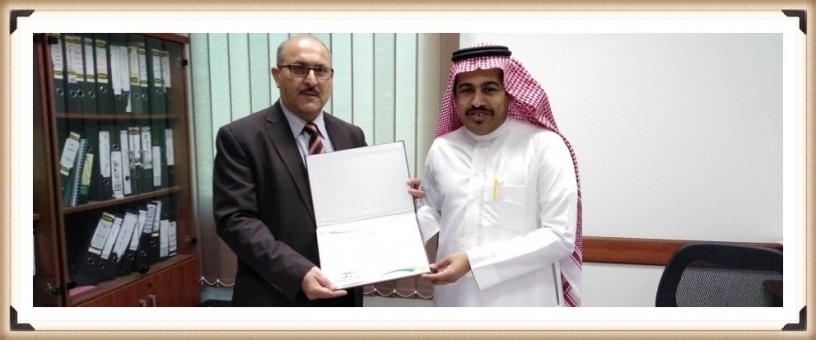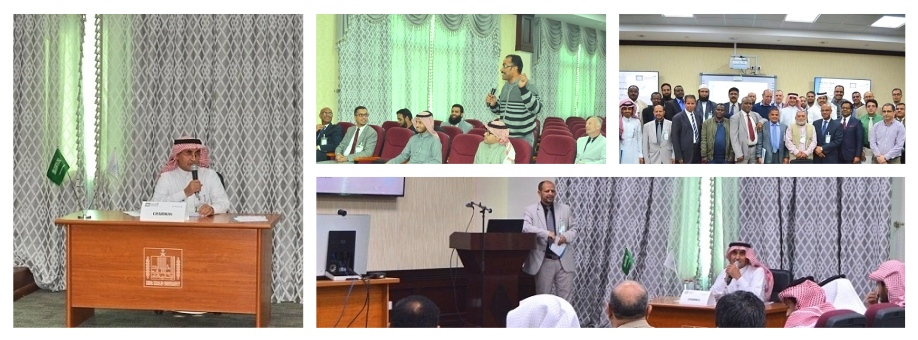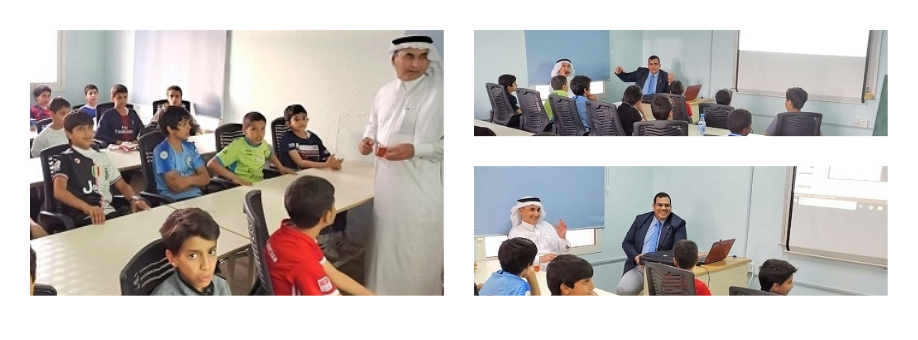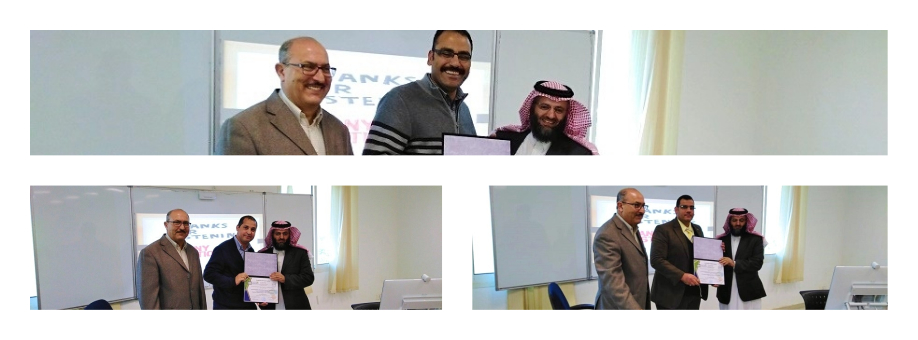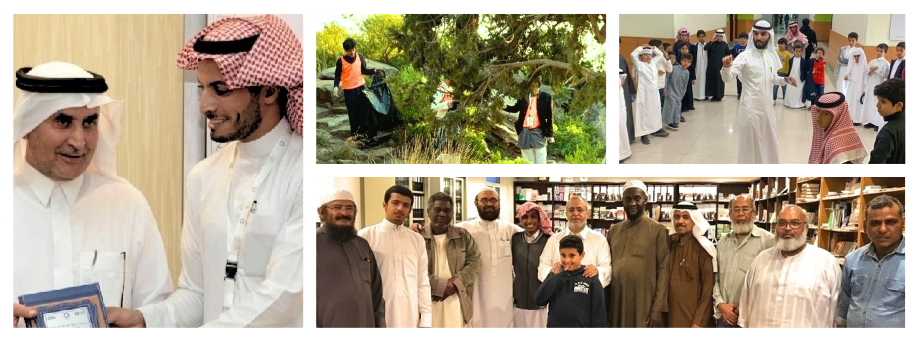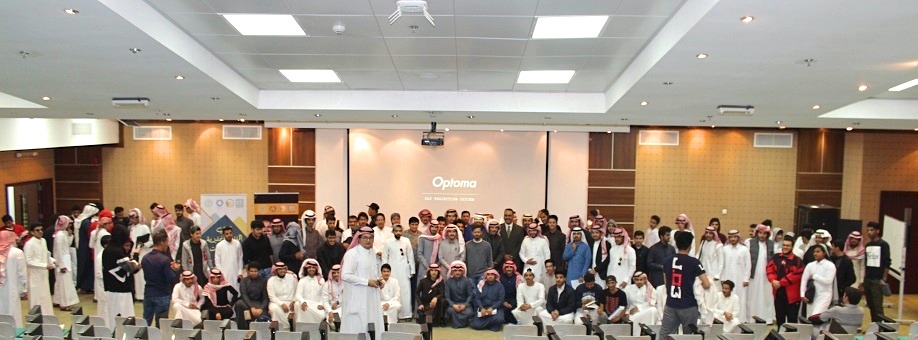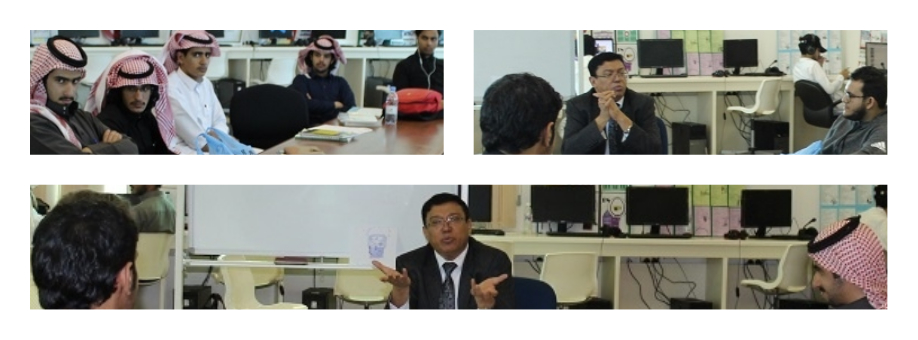News
The 14th Annual Research Day, under the supervision of Dr. Ismail Al-Refaai, Director of the Language Research Center, was held on April 03, 2019 at King Khalid University.
This event successfully achieved the 2nd position according to the evaluation made by the Deanship of Scientific Research, King Khalid University.
This success was the result of dedicated efforts made the members of the organizing committee led by Dr. Abdullah Al-Melhi, Dean of the Faculty of Languages and Translation and Dr. Ismail Al-Refaai. The committee members included Dr. Sayed Rashid Shah, Javed Ahmed, Mohammad Adil, Azaad Hayat, Khalid Abdullah Al-Asmari, Faisal Alfadhil, Mohammad Jaber, Salahud Din Abdul Rab, Md. Mahmudul Haque, Amal Abdelsattar Metwally, and Ghada Al-Amri.
In total, there were 19 oral presentations and 28 poster displays.
Date: 4/8/2019
Source: Mohammad Adil Siddique
The 14th Research Day, under the supervision of Dr. Ismail Al-Refaai, Director of the Language Research Center, was held on April 03, 2019 at King Khalid University. The program began with a recitation of the Holy Qur'an and a welcome speech by Dr. Abdullah Al-Melhi, Dean of the Faculty of Languages and Translation. In his remarks, he encouraged faculty members as well as the graduate students to take part in such an event and at the same time emphasized its importance. He highly appreciated the faculty members and especially the students who made substantial contributions to the event. He also suggested the researchers be more interested in topics having practical importance that would cater to our current teaching and learning situation. He conveyed his heartfelt thanks to the organizing committee who had worked day and night behind the scenes.
The first speaker of the first session was Dr. Abdul Wahed Al-Zumor whose presentation was titled “Stance-taking Strategies in Advanced L2 Students' Critique Writing: A Corpus Based Study”. His study explored stance-taking strategies as employed by MA Applied Linguistics students when they write a critique. Dr. Karem Abdullateef spoke on the subject of “The Effect of Training College Freshmen on Direct Negotiation Strategies on Improving Their Acquisition and Use of These Strategies and Foreign Language Anxiety”. He emphasized the improvement of students' post-performance in meaningful negotiation strategies. Dr. Hala Mohamed Osman Salih and Dr. Mazeegha Ahmed Al-Tale presented on “Saudi Female EFL Learners' Cognitive Styles and Reading Comprehension: Implications for Reading Instruction”. The paper focused on the cognitive styles of Saudi female EFL learners and their relationship to academic performance in reading comprehension. Tanzin Ara Ashraf spoke about “Strategies and Enhancing Saudi EFL Learners' Oral Fluency by TBLT (Task-Based Language Teaching) Approach”. Her presentation emphasized the application of the TBLT approach in order to enhance EFL learners' fluency in speaking.
The second session started with Dr. Ahmad Al-Faifi's paper titled "Why Does the End-Product of Students' Translations Not Match the Input (ST)?”. He concluded that many of the students' translation errors could be avoided if they made optimal use of the Arabic courses provided by the university, as well as the English ones. Dr. Adel Bahameed delivered a presentation titled “Nine Practical Formulas for Translating Proverbs” that aimed at showing the translation equivalences used and present justifications for the preferred equivalences and developing a comprehensive strategy or a model for translating proverbial expressions. Dr. Eyhab Abdulrazak Bader Eddin spoke about “Fleeting Glimpses into the Semantic Peculiarity of Translating Nouns in the Glorious Quran”. His paper concluded that the seemingly noun synonyms in the Quran are not so, resulting in a lexical asymmetry in translation. Rahaf Khalid Asiri and Ameena Awad Algarni talked about “Translation from English into Arabic from Linguistics' Perspective”. They highlighted the interrelation between linguistics (syntax and semantics) and translation, and how this relationship affects the process of translation from English into Arabic. Dr. Najat Ahmed Busabaa and Dr. Zahra Ahmed Misfer talked about “Stress Placement and the Difficulties Encountered by EFL Female Students at Faculty of Languages & Translation, KKU”. They highlighted the reasons for the inability to apply the rules of stress placement properly and practically by the EFL Female students at the Faculty of Languages & Translation. Shanjida Halim, Dr. Rizwana Wahid, Tanzina Halim, and Dr. Oveesa Farooq spoke about “Why Don't Learners Learn What Teachers Teach?”. They emphasized the fact that both teachers and learners need to go to the language classroom with well-determined plans or intentions. The last speaker of the session, Mohammad Adil, presented his paper titled “Practical Application of Learners' L1 to Teaching Meaning in EFL Classes”. He revealed that learners' first language plays a significant role in helping them with the clarification of meaning in a more straight-forward way provided the teacher simultaneously uses strategies to reduce L1's negative impact on the learning process.
The first presentation of the third session was delivered by AmatulHaffez AbdulRaheem Alvi. Her paper was titled “Multimodal Interactive Teaching Methodologies as Effective Tools in Literature Courses in EFL Classrooms”. She emphasized that there is a dire need of implementing multimodal and interactive teaching methodologies that reconcile traditional teacher-centered methodologies (LM, CM, PGM, SG, etc.). Md. Mahmudul Haque spoke on the subject of “Cognition, Metacognition and Autonomy: Understanding the EFL Learner's Cognitive Process”. He explored the connection among cognition, metacognition and learner autonomy, examined the EFL learners' cognitive process, and provided suggestions for checking the possibility to conduct empirical studies in order to identify the ways by which cognition, metacognition, and learner autonomy are connected. Dr. Shadma Iffat Rahmatullah talked about “Female Undergraduates' Inclination Towards Studying English Literature for Learning English Language”. Her study examined whether the students are inclined towards or are reluctant to study English literature for the purpose of critical study or language enhancement. The factors which lead to students' tendencies to avoid opting to choose literature for further studies were analyzed and presented. Ayman Hassan Hammady Zoli talked about “Mutual Intelligibility between Bani Malek and Al-Rayth Dialects”. The degree of mutual intelligibility between 'Malekis' and 'Al-Raythis' and the factors causing this phenomenon was highlighted. Dr. Eman Mahmoud Ibrahim Alian delivered a presentation titled “The Effect of Some Reflective Thinking Strategies Based Program on Developing Literary Reading Skills and Metacognitive Reading Awareness of the EFL Student Teachers”. Her paper examined the effect of reflective thinking strategy based programs on developing literary reading skills and metacognitive reading awareness of the EFL student teachers. Eman Alzaanin presented her paper titled “Theorizing Language Teacher Cognition: A Constructivist Grounded Theory Analysis”. She highlighted the flexibility of procedures in grounded theory to build a theory that effectively captures language teachers' cognition, explains their pedagogical practices, and depicts how language teachers perceive and react to their ecological contexts where they operate. At the conclusion of this session, Dr. Hasan Mohammed Jaashan presented his paper titled “Decoding Sense in Caricatures: A Study in Semio-Stylistics”. He showed that the relationship between sign and object in all caricatures results in one of the three ways (interpretants) and concluded that caricatures are mere connections between signs and objects. He explained that this results in formulating specific perceptions about the highlighted phenomena.
Besides the oral presentations, the following posters were displayed as well.
“Paperless Assessments and Lectures in EFL classes at FLT Female Campus: Teacher's Perspective”, Aisha Alvi;
“Interrogatives in Classical Arabic as Represented in the Quran”, Alaa Al-Qarni, Ashwaq Al-Qahtani, and Maryam Shami;
“Inductive versus Deductive Approaches of Grammar Teaching and Learning: A Case Study on Teaching Grammar to Diploma Students at King Khalid University”, Amal Abdelsattar Metwally;
“The Translation of Four Types of the Particle Lam (Casualلام التعليل, Imperativeلام الأمر, Denial Lamلام الجحود, لام جواب لو in the Holy Quran into English”, Asma'a H. Albin Hassan, Saja Alahmari, Hajar Asiri, Ohood Al-Qahtani;
“The Epistemological Aspects of Discourse Analysis Toolkit in Analyzing Business Texts”, Ayman Hamad Elneil;
“Investigating the Role of Medical Terms Translation in Facilitating Learning Process for Medical Students”, Dr. Abdulrahman Elyas;
“Utilization of Video Technology to Promote Saudi EFL Students' Authentic English Language: With Reference to Unlock Level 1 Course”, Dr. Ali Albashir Alhaj;
“The Impact of LEP Activities on Speaking Skills: A Case Study on EFL Students at King Khalid University”, Dr. Dawood Ahmed Mahdi;
“Hegemony of English and Englishes from Linguistic Imperialism and American Perspective”, Dr. Elsadigh Ali Elsadigh Elnadeef;
“Demotivating Factors Affecting EFL Learning of Saudi Undergraduate Students”, Dr. Fadi Maher Al-Khasawneh;
“Investigating the Role of Comprehensive Reading in Understanding the Contextual Meaning of a Written Discourse", Dr. Hasan Mahill Abdallah Hasan;
“Exploring EFL Graduate Students' Attitudes Towards and the Use of Mobile Phones in Language Learning”, Dr. Ismail Al-Refaai;
“Implementing the Eclectic Method to Teach English to Science Undergraduates in KKU”, Dr. Najmus Sharifa;
“The Role of Motivation in Second Language Learning at King Khalid University”, Dr. Rafiq Ali Al-Shameri and Mohammad Al-Fuad;
'Ideological Conflicts in Tahmima Anam's 'The Good Muslim', Dr. Safia Asad;
“Summary Writing Strategies Used by EFL Learners”, Dr. Wafa Ismail Saud;
“Experience and Mystery of the Marabar Caves in A Passage to India”, Irin Sultana;
“Attitudes and Perceptions of Applied Linguistics and Translation Female Students Towards Using Virtual Classes in the Master Program at King Khalid University”, Messadah Shaye Al-Qahtani;
“Pedagogy: Learning Enhancement with Technology”, Nusra Mehtab and Sufia Sultana;
“Investigating the Role of Classroom Interactional Activities in Developing University Students' Writing Skills at Arab Countries”, Rana Muhammad Nadim Akter;
“The Impact of the Linguistic Hegemony of English on Saudi EFL Learners Identity: English Department-Female-at King Khalid University”, Rawiah Ali Al-Shehri;
“Investigating Saudi Female Students' Speaking Problems and Solving Strategies in Asir Region”, Roa'a Abdullah Hussein, Khadijah Hezam Al-Shehri, Manal Mohammad Abdulhadi, and Nidaa Abdullah Albakri;
“Linguistic Analysis of the Print Media Advertisements”, Saba Sarwar;
“The Effect of Stopping Regression on Reading Speed and Comprehension of EFL Undergraduate Students of King Khalid University”, Salahud Din Abdul Rab;
“The Impact of Using E-Learning Technologies as a Tool in EFL Learning/Teaching in the Department of English at King Khalid University: An Empirical Research on Its Effectiveness”, Samar Al-Almner;
“The Impact of Age on Second Language Learner Fluency Critical Period of Speaking Second Language Fluently: A Case Study of FVIS Students”, Sara Ahmed Abdullah Alasiri;
“Learning Goals and Teachers' Roles”, Sharmin Siddiqui;
“An Interactive Tool to Promote Effective Learning for EFL Learners”, Sufia Sultana, Nusra Mehtab, and Richa Rastogi.
The Language Research Center is committed to enhancing and expanding scientific research efforts throughout the university system. Advanced research is a vital element of the national development strategy and a primary objective under Vision 2030. The Faculty of Languages and Translation is continually increasing its research efforts to contribute towards the achievement of these goals. It goes without saying, the 14th Research Day was a great success and it gave the participants an opportunity to discuss and share their thoughts.
Date: 4/5/2019
Source: Mohammad Adil Siddique
Multimedia Source: Mohammad Taisir Albokai
The Faculty of Languages & Translation (FLT) is partnering with the Asir Region Directorate of Education on community outreach initiatives. On March 31st, Habib Bin Zaid Elementary School in Abha hosted Dean, Dr. Abdullah Al-Melhi, and Dr. Eyhab Bader Eddin, MCIL, CL. Many of the students, along with some of their teachers and administrators, participated. The purpose of the program was to introduce the children to higher education and foreign language usage.
School Principal, Mr. Mohammed Farhan, first welcomed the FLT visitors to the enthusiastic crowd. After leading the students through a few linguistic exercises to pique their interest, Dean Al-Melhi and Dr. Bader Eddin transitioned their presentation into the fundamentals of translation. Of course, interpreting and translating are extremely complex disciplines that would be of little interest to most children. Undaunted, the FLT representatives simplified the concepts and broke down the process of translation into rudimentary components. Dean Al-Melhi and Dr. Bader Eddin used a 'down- to- earth' method, complete with simple examples that helped the students understand the need for and methods of translating. The simple and interesting method of introducing the topic came into fruition when face-to-face classroom interaction was observed.
Once the students were fully engaged, the FLT professors gave a brief PowerPoint presentation summarizing the importance, history, and methods of translation. They also showed the students the differences between simultaneous and consecutive interpretation. After reviewing the advantages and disadvantages of each method, the students voted on their preferred translation method.
Dean Melhi stated that, 'It is wonderful having the opportunity to reach out to young people. These grade school students represent unlimited potential, and the future of our nation. One day, some of them will definitely fill our shoes as professors, probably at the same faculty we are representing today, and they would bring back today's event. Vivid, sweet and warm or dim, distant and fading, their memory of today's fleeting visit will come flooding back in their memory. It is important to instill the desire for higher education and life-long learning at an early age. These cooperative outreach initiatives help inspire students, and present some of the career opportunities available to them as they mature'.
Dr. Bader Eddin echoed Dean Al-Melhi's sentiments in noting that keeping the Kingdom's youth engaged and hungry for learning is an absolute necessity. 'We want to show the children that universities are safe and welcoming places that help people learn more and do more in life. One abiding memory of mine dates back to childhood days back in Kuwait where I was sitting at a desk as a pupil. Evoking scenes from childhood days is retained for good with a delicate scent lingering in the air of memory', he added wallowing in a wave of nostalgia for childhood years. Dr. Bader Eddin then showed the students a series of short videos and multi-media presentations that reinforced the live lesson.
The Faculty of Languages and Translation is dedicated to community service and taking an active role in achieving educational and socioeconomic objectives at both the regional and national levels.
Date: 4/1/2019
Source: Faculty of Languages and Translation
Those who presented research in the bi-monthly Language Research Center seminars were recognized for their hard work this academic year. The Faculty of Languages and Translation awarded certificates of appreciation at a ceremony on March 20th organized by the Language Research Center.
Dr. Yahya Asiri, Vice-Dean of Faculty of Languages and Translation, represented the department at the ceremony. He conferred certificates of appreciation to the following valued faculty members:
Ms. Hanan Al-Subai, Linguistic Hegemony of the English Language in the Medical Context of Bisha King Abdullah Hospital;
Dr. Munassir Alhamami, Attention to Intention;
Mr. Erich Beer, Some Practical Considerations Regarding the Teaching of Reading Comprehension;
Dr. Mohammed Shuaib Assiri, Comparing Multiple Choice, Verb Conjugation, and Error Correction in Grammar Assessment;
Prof. Hamad Al-Dosari, Developing and Assessing the Relationship Between Intercultural Communication Competence and Intercultural Sensitivity in the EFL Classroom;
Dr. Mazeagha Al-Tale', The PECAL Model: Bringing the Best Together for Dynamic Gains;
Dr. Michael Hadzantonis, Frame Theory and Footing in Linguistic Anthropological Analysis- Part 1 and Discourse Analysis in Linguistic Anthropology (and beyond): Part 1;
Ms. Saja Al-Ahmari & Ms. Jawaher Al-Enzi, Translation and Culture;
Dr. Fouad Elkarnichi, Examining What Translation Education Research Say about Practices in Translation Programs (Special Focus on the Arabic Context);
Dr. Hasan Mohammed Jaashan, An Overview of the Book 'STYLISTICS';
Ms. Hanan Al-Shahrani & Ms. Maryam Al Shamrani for, Translator’s Message;
Dr. Barbara Rumbinas, A Multimodal Analysis of Minstrel Performance and the Codification of the African American Stereotype in Nineteenth-Century Culture;
Dr. Mahmoud Radwan, Madness in Arabic Narratives;
Dr. Eyhab Bader Eddin, Multiplicity of Different English Functional Semantic Realizations of the Translation of the Arabic Preposition ب and Translation Process Mapping: Key Tools to Explore Translation Cognitive Dimensions.
The Language Research Center and the Faculty of Languages and Translation are committed to faculty development in order to better serve our college and the university at large. These programs inure to the benefit of all.
Date: 3/25/2019
Source: Mohammad Adil Siddique
Dr. Eyhab Bader Eddin delivered a presentation titled Translation Process Mapping: Key Tools to Explore Translation Cognitive Dimensions at a seminar organized by the Language Research Center of King Khalid University held on March 20, 2019.
Dr. Bader Eddin, in his presentation, focused on the translation process from the cognitive point of view. He explained the Communication Theory. He stated that this theory is based on the premise that product-based models are inadequate to explain the realities of translation. He noted that this theory was adopted by Nida and Reyburn in 1981. According to this theory, as observed by Dr. Bader Eddin, one is not likely to comprehend and respond to a message in identically the same way. The rationale is that no two people share the same linguistic, educational, cultural, social backgrounds.
Dr. Bader Eddin also mentioned that a translator is an active participant in communications who, either wittingly or unwittingly shapes or shades messages being translated. This phenomenon became widely recognized by way of Koller's research in 1979. Later, the 'Relevance Theory' (RT) rose in popularity among linguists and translation professionals. This theory recognizes a shift from static linguistic conceptualization of translation to a cognitive approach to translation.
It is worth mentioning that Dr. Bader Eddin is uniquely qualified to opine upon the various methods of accounting for cultural differences in language translation. He is a full member of the Chartered Institute of Linguists (MCIL) and a Chartered Linguist (CL). Many language professionals have never heard of the Chartered Linguist professional designation, and for good reason. The CL was adopted fairly recently, as per Royal Charter of HM Queen Elizabeth II in July of 2005. Only 520 translators worldwide have achieved CL status, only 3 of whom are in the Middle East. Dr. Bader Eddin noted: 'Enlightened linguists place a high value on all languages, and truly respect the societal values and cultural norms of the various peoples that use each language. Of course, translators and interpreters must have a thorough understanding of the technical aspects of their subject languages. But technical competence is not enough. To ensure truly accurate communication between and among people, language professionals must have a deep understanding of each participant's culture and society. Critical information can be overlooked or misinterpreted because of the inherent nuances of language. One must really know the society and the culture to completely understand many of these nuances. We all benefit politically, economically and socially when human communications are thoroughly and precisely understood. We all may suffer when things get 'lost in translation'. One must make a sharp distinction between 'a loss in translation' and 'a loss of translation'. All languages differ in what they 'MUST' convey, rather than what they 'MAY' convey, and it is between that 'must' and 'may' what has attracted Translation scholars' attention to write on such many disciplines as translation criticism, translation didactics, translation quality assessment, and descriptive translation studies. The CL designation isn't something used to pad a Curricula Vitae or a certificate for bragging rights. Accepting the CL is an acknowledgment of responsibility to use one's linguistic acumen for the betterment of society. I am proud to represent King Khalid University and the Faculty of Languages and Translation as a CL professional'.
The seminar was very informative, interactive and overall successful.
Date: 3/25/2019
Source: Mohammad Adil Siddique
Please click here to view a recording of the seminar.
Introduction
The English Club is sponsored by the Faculty of Languages and Translation (FLT), and operated under the guidance of one faculty director and one student leader. The English Club has three primary objectives: English language skills development, community service and supporting higher education.
Recently, the English Club has been extremely active and busy. Due to the sheer volume, scope and variety of worthwhile club events, the English Club news is published in aggregate fashion as follows:
Team Up to Clean Up and Green Up
Club members conducted a volunteer clean-up day in a public park nestled in the Al-Souda mountains. For several hours the volunteers picked up trash and debris in order to beautify the park. The participants also learned about the benefits of recycling and litter-free environments. Local community members were thrilled with the results, and hope to join the English Club with additional volunteers for future clean-up days. Expanding this program will lead to the beautification of more areas and increased public environmental awareness.
School Children Get a Glimpse of University Life
One English Club priority is promoting higher education, and it's always helpful to start early. The club, led by director Faisal Alfadhil, recently hosted classes from the Al-Andalus Elementary School and Excellent Education Schools from Abha. Each class toured the university facilities and had the opportunity to speak with university students, faculty members and staff. The grade school students had a lot of fun seeing the university and asking questions.
The purpose of hosting these visits is to show children that universities are safe, supportive and welcoming places. When they reach young adulthood, they may not remember the details of their visit to KKU. But they will likely recall that visiting the university was a positive experience. This will encourage young adults to pursue advanced education once they graduate high school.
Electronic Gaming Competition - An Outlet for Stress
For several weeks members of the English Club sponsored an electronic gaming competition. The selected game was FIFA 19. More than 60 FLT students competed in the event. After much fierce but friendly competition, FLT student Mohammed Dhafer took first place. The purposes of the event were to give the students a stress relieving break from their rigorous academic obligations, and to promote good sportsmanship. Everyone had a fine time and congratulated Mohammed Dhafer on his hard-won victory.
Weekly Coffee Talk at the LEP
The English Club established a standing program titled 'Coffee Talk'. Each Wednesday the Club hosts a gathering in the LEP. The purposes of this program are to help students improve their language skills through informal conversations, and short faculty presentations on a variety of language learning topics. These gatherings are also an opportunity for students to socialize and exchange ideas.
Coffee Talk is every Wednesday at noon in the LEP (room A/3/1) at the end of the hall of FLT classrooms. All students are welcome. Refreshments are available.
English Club Closing Ceremony for Spring 2019
The English Club has been very busy this Spring. As the semester winds down, the club members took a few moments to look back and reflect upon all of the events and activities conducted during the school year. Therefore, the English Club hosted a year-end review meeting last week.
FLT Dean Abdullah Al-Melhi sponsored the event, with English Club Director Faisal Alfadhil and Student Body English Club President Abdulaziz Dahlan serving as master of ceremonies. In his opening remarks, Dean Al-Melhi commended the English Club members and the club director for all of their hard work. 'Naturally, the English Club helps current FLT students improve their language skills, which is inherently valuable. As highly noteworthy additional benefits, the club serves the community, promotes good citizenship and encourages higher education to young people. We hope to expand the English Club membership to include more of our students and increase community outreach efforts' he said. The Dean further explained that extracurricular activity involvement teaches students to manage their time and broadens their university experience.
The English Club presented a video montage chronicling many of the events that occurred over the last few months. Subsequently, there was an awards ceremony recognizing numerous faculty members who participated in various English Club functions. Current club director Faisal Alfadhil thanked former club director Khalid Al-Qasemi for all of his foundational work with the English Club, and for ensuring a smooth transfer of leadership responsibilities.
English Club Answers the Call in Time of Crisis
The English Club took on an unplanned community service project in the wake of the New Zealand mosque massacres. Due to this most unfortunate event, there is a shortage of Holy Qurans and other Islamic material in the nation of New Zealand. The English Club has answered the call to help remedy this situation.
The club is working with the Mada Program to collect and transport Holy Qurans, books and related materials to mosques and religious centers on the remote island nation. Electronic Dawah Project (EDPr) Director and former FLT Dean, Dr. Abdullah Abu Eshy, said he knew he could count on KKU and the FLT to help. 'We cannot undo this tragedy, but we will do everything in our power to provide aid and comfort to the families and communities suffering in the aftermath. I am proud of the English Club members for volunteering in this time of need. Their efforts are critical. Our wounded brothers and sisters are far away, but they are not alone' he said. Prof. Abdallah Hady Al-Kahtany, former Dean of Faculty Affairs, explained that the purpose of the volunteer project was to provide books to those who wish to discover and learn about Islam from authentic sources. 'I am happy these young men came out tonight for a noble cause. Our work does not stop here. We will respond to all requests that come our way and play our part in helping to spread the correct message of Islam', said Prof. Al-Kahtany.
Conclusion
The English Club thanks all of its members for a highly productive year. The club also thanks Dean Al-Melhi, Vice Dean, Dr. Yahya Asiri, and Chairman, Dr. Munassir Alhamami, for their continuing patronage and guidance. The university and the FLT are committed to continuous improvement in academics and ever-expanding social outreach programs. The English Club is an effective means of fulfilling these objectives. The club has an open invitation to students who would like to join and participate in this worthwhile venture.
Date: 3/22/2019
Source: Faculty of Languages and Translation
On 7 March 2019, the Scientific Research Committee organized a presentation titled 'Language of the Professionals' which was delivered by Ms. Anjum Mishu, Lecturer, Dept. of English, for the M.A. students of Faculty of Languages & Translation. The presentation was divided into three segments starting with the topic 'How to Write a Research Proposal'. Next, the topic was 'Language of the Professionals' and finally, 'Vocabulary of the Academics'.
A couple of important points were discussed by the presenter such as following the 3 C's Rule (Clear, Concise and Coherent) in a research paper, and the usage of academic vocabulary. The M.A. students were highly encouraged to use the language of the academicians in their work. It was an informative presentation and all the members of the Scientific Research Committee attended this seminar.
Date: 13 March 2019
Reported by: Shanjida Halim, Member, SRC
This past Sunday Dr. Mahmoud Radwan conducted a workshop titled 'Approaches to Literary Studies' for students of the Faculty of Languages and Translation. The English Club sponsored the event, and more than 200 students and faculty members attended.
The workshop covered a variety of topics. First, Dr. Radwan defined literature and distinguished literary works from other forms of writing. Next, he discussed the importance of creativity and imagination in developing literary writers. Dr. Radwan then reviewed the three major forms of literature (poetry, drama and prose), and the elements of literary works. Later he recounted the major historical developments in English literature.
Finally, Dr. Radwan discussed in detail the benefits of both reading and writing literature. Literature offers readers alternative perspectives and encourages critical thinking. Literary works from varying places and past times enhance readers' understanding of other people and cultures. Much of literature provides valuable insight into the human condition. It is worth noting that exposure to literature can greatly enhance a person's writing skills.
The workshop participants benefited greatly from Dr. Radwan's presentation. Many students were inspired to utilize their innate talents and capabilities to write literature of their own. While literature classes encourage student creativity, these special workshops reinforce classroom learning and enhance students' personal development. Students also received words of encouragement and examples of inspiration when Dr. Radwan referred to the most prominent figures in Arab literature. Examples of such writers include Nguib Mahfouz (Egyptian), Radwa Ashour (Egyptian), Ghazi Al Gosaibi (Saudi), Abdou Khal (Saudi), Abdelfattah Kilito (Moroccan), Ibrahim Al-Kuni (Libya), and Amir Tag Elsir (Sudan). The English Club is proud to sponsor this and other events for the student body. Each attendee at Dr. Radwan’s presentation will receive a certificate.
The FLT fully supports the creative literary arts. In a world increasingly focused on technology and technical prowess, people often overlook the inherent value in literature. The department is committed to preserving society's appreciation for great writing and contributing to the ever-expanding body of literary works.
Date: 3/12/2019
Source: Faculty of Languages and Translation
The English Club recently sponsored a social gathering at the Al-Lasan Campus which was open to all students and faculty members. Student activities director Faisal Alfadhil explained that he planned the gathering to serve a variety of important purposes. First, the event was to strengthen the relationships between students and faculty members. Also, the gathering helped further develop positive relationships among the students, and encourage their participation in future departmental and university-wide activities. Third, the event provided students in the department an opportunity to practice English. 'It is beneficial for language learners to practice the target language in a natural, informal setting' said Director Alfadhil. Finally, the festivities allowed the students time to unwind after the mid-term exam period, and gave them a chance to have some collegial fun.
The evening was busy with many activities. First, there was a series of 5-on-5 football matches. After each match, the prevailing team retained the field to face a new challenger. The football competitions were friendly, but fierce. Every team performed well, and each player exhibited gentlemanly sportsmanship. After a short rest period, everyone prayed en masse.
Next, the Spelling Bee competition commenced to the great excitement of the participants and the audience. Seasoned teacher and word-master Hassan Costello directed the Spelling Bee, assisted by Director Alfadhil keeping score, and English Club President, Abdulaziz Dahlan, monitoring the timer. After several rounds of excellent performance, the first-place finish came down to a ‘sudden death spell-off’ between senior students Fawaz Al-Qahatani and Saud Al-Shahrani. Many of the words used in the competition contained reverse ordered, double vowels which are notoriously difficult to spell even for native English speakers.
After a lively exchange of spelling efforts, Fawaz ultimately prevailed taking first prize with Saud as a most worthy runner up. Vice Dean of Academic Affairs, Dr. Yahya Asiri, presented the Spelling Bee awards. The top finishers received 100 SAR and 50 SAR Jarir Bookstore gift certificates for first and second place respectively. Many of the students who watched the competition expressed interest in participating in future spelling bees.
After the Spelling Bee, the department hosted an open forum discussion. All students and faculty members were allowed and encouraged to raise issues about the FLT department operations. Everyone was free to discuss issues, problems, suggested improvements and the like. The purpose of the form was to get honest feedback from stakeholders. This is an essential component of the FLT's commitment to continuous improvement. Among the topics discussed was the need for greater informal student-teacher engagement. The consensus was that additional social gatherings would greatly help to advance the goal of reinforcing relationships.
Vice Dean Asiri, Chairman, Dr. Munassir Alhamami, Academic Development Unit Head, Dr. Abdulrahman Almosa, Academic Guidance and Counseling Unit Head, Dr. Dawood Mahdi, and Dr. Saeed Al-Surf all spoke to the students. While their remarks varied, the theme was the same. The faculty and staff are there to help the students succeed in their academic and subsequent careers. In his address to the students, Vice Dean Asiri eloquently summarized the faculty adjurations in saying:
'Educating the next generation of leaders is a critical duty. Helping all of you become consummate professionals and upstanding citizens is our mission. Our nation’s future depends upon your drive, abilities, and integrity. The college experience involves many challenges, hardships, and frustrations. We encourage you to embrace every difficulty as an essential part of learning and a building block for your ultimate success'.
The faculty expressed optimism about student attitudes towards education and their apparent eagerness to make the most of their time at the university.
After prayer, the attendees enjoyed a delicious meal. The dinner conversation was lively and convivial. The discussions continued well into the evening, and a fine time was had by all. This social gathering is indicative of FLT's commitment to the students and higher education.
Date: 3/9/2019
Source: Faculty of Languages and Translation
Dr. Mahmoud Radwan made a presentation titled “Madness in Arabic Narratives,” which was organized by the Language Research Center of King Khalid University on March 06, 2019.
Dr. Radwan began by defining madness as “the state of having a serious mental illness, or extremely foolish behavior, or a state of wild or chaotic activity.” He tried to relate the concept of madness to literature.
Dr. Radwan reiterated the fact that literature had always been interconnected with madness. He stated that not only is the idea about madness associated with the author; it also has a close association with characters created by him or her. Madness in literature can refer to both writers who are known to have been insane and to abnormal characters in literature. Thus, there are three major definitions of madness in literature; namely, the "mad writer," the "mad characters," and the application of psychological terms to literary madness, said Dr. Radwan.
Dr. Radwan mentioned the names of some writers (Guy de Maupassant, Ezra Pound, Jonathan Swift, Jack London, and Virginia Woolf) who had suffered from mental illness. He also spoke about mad characters created by some authors who were interested in exploring human behavior, contradictions, inner anxiety, and pathological actions.
Dr. Radwan finally showed how madness was involved in Arabic narratives. He mentioned that Mohamed Al-Samman's Madness in Arab Culture is one of the most comprehensive critiques of the discourse of madness. He added that Arab writers utilize the fictional conventions of madness as a textual strategy to break the culture of silence about a discourse evaded on purpose and thus they disinter a world that is mysteriously hidden. Examples of such writers include Khudeir Miri (Iraq), Samiha Khrais (Jordan), Usama Issa (Palestine), Ahmed Yousif Dawood (Syria), Ghazi Abdul Rahman Al Gosaibi (Saudi Arabia), Walid Damag (Yemen), Khairy Shalaby (Egypt), Ihab Adlan (Sudan), and Ismail Yebrir (Algeria).
The seminar was very informative and a great success.
Date: 3/8/2019
Source: Mohammad Adil Siddique
برعاية عمادة كلية اللغة و الترجمة، أقامت وحدة التوجيه و الإرشاد بالكلية دورة تدريبية بعنوان "كيف ترفع معدلك التراكمي؟ " قدمها وكيل كلية المجتمع بخميس مشيط و المدرب المعتمد الدكتور/ علي عبدالله مرزوق بقاعة الاحتفالات بكلية اللغات و الترجمة، شارك فيها أكثر من مائة و عشرين طالبا صباح يوم الثلاثاء 28/6/1440، تعرف المتدربون في هذه الدورة على الطرق المثلى لرفع المعدل الأكاديمي، إضافة إلى التعرف على الأنماط الشخصية، و تخلل الدورة أوراق عمل و ألعاب تدريبية، و أشرف على الدورة د. داود أحمد مهدي رئيس وحدة التوجيه والإرشاد بالكلية.
The Women's English Club of the Faculty of Languages and Translation and the Deanship of Student Affairs held a program titled 'Winter Picnic' on Wednesday the 30th of January from 9 a.m. to 11 a.m in the inside hall of building C.
The program was opened by Dr. Suaad, Mrs. Safiah, Mrs. Maram and the members of the English Club welcoming the rest of the students. The program was filled with a lot of great inspirational ideas and discussions about the students' academic life. The students also prepared the food corner, ground seating area and some gifts to give to the students attending the program.
Source: English Club
Date:30/1/1019
The Faculty of Languages and Translation takes pleasure in announcing that the Chartered Institute of Linguists, London has named Dr Eyhab Abdulrazak Bader Eddin as a Member and a Chartered Linguist. The Chartered Institute of Linguists (CIOL) is the UK-based professional membership body for language practitioners. It aims to enhance the recognition and promote the value of languages and language skills in the public interest. Founded in 1910, CIOL was granted its Royal Charter by HM Queen Elizabeth II on 19 July 2005 and formally began operating as The Chartered Institute of Linguists on 1 September 2005.
Having satisfied the qualifying requirements prescribed by the Chartered Institute of Linguists, Dr Bader Eddin has been appointed as a full member, and a Chartered Linguist in the field of Translation and Language. He is thus referred to as a Chartered Linguist as a Translator and a language specialist. Thus, he is entitled to use the designatory letters ‘MCIL’ ‘CL’. He holds membership no. 55364 which is a unique reference no. which can be verified through: https://www.ciol.org.uk/member-check?id=55364
Or https://www.ciol.org.uk/member-check/profile/55364/14737.
The Statistics Department at CIOL has confirmed that Chartered Linguists are 520 across the world, 3 of these are based in the Middle East Region, including him.
On this auspicious occasion, we could not let this occasion go by without wishing him continued success.
Date: 3/3/2019
Source: Faculty of Languages and Translation
Dr. Barbara Rumbinas delivered a presentation organized by the Language Research Center of King Khalid University on February 27, 2019.
Dr. Barbara began her presentation by defining Multimodal Analysis which is actually an inter-disciplinary approach that acknowledges that communicative acts contain more than verbal utterances or written texts. She said communicative acts are meaning-generating events including visual, spoken, gestural, written, and other three-dimensional modes of interaction. The Multimodal Approach to research, she said, examines the communicative interactions of these elements as well as their inter and intra-relationships to reveal, among other things, ideological perspectives and power relations.
The seminar was very informative and a great success.
Date: 3/2/2019
Source: Mohammad Adil Siddique
On Wednesday, the English Club held its 4th lecture of the Spring semester. The guest speaker was Faculty of Languages and Translation Asst. Professor Dawood Mahdi. Dr. Mahdi is also the Head of the Academic Guidance and Counseling Unit. The subject of the well-attended event was the art and science of translation.
First, Dr. Mahdi explained many of the misconceptions about the disciplines of translation and interpreting languages. He noted that many people believe that translation is merely converting individual words from one language to another. 'Languages have diverse structures and conventions. Interchanging literal meanings of words between languages is not a method for effective communication' said Dr. Mahdi. He further noted that languages are rich in idioms, metaphors, and figures of speech. In these cases, literal translations simply do not work. Similarly, in many languages, individual words have multiple meanings. Therefore, rudimentary translation will often be in error.
Dr. Mahdi also reviewed some less common misconceptions about translation and interpreting. Some people believe that any bi-lingual person can translate/interpret the two languages. Dr. Mahdi explained that translation is a specialized discipline that requires advanced training and practice. He also explained that there are sub-specialties even for those who are skilled general translators. For example, translating in the fields of law, medicine, engineering, etc. require specialized knowledge of those fields. Another misconception is that translating and interpreting are the same. Dr. Mahdi noted that interpreting requires the language specialist to work in real time, which is extremely difficult even for those fluent in the languages. Finally, he noted that some people erroneously believe that translators do not need dictionaries or other reference material. 'Reference materials are the tools of the trade for professional translators' said Dr. Mahdi.
Later in the program, Dr. Mahdi told the students that which is required to be a successful translator/interpreter. 'First and foremost one needs to be fully committed to the target languages' he said. Translation also requires intensive training and many hours of consistently practicing the craft. Dr. Mahdi also stressed that translators must be scrupulously committed to accuracy and approach the profession with honesty and integrity.
In response to a question by a Level 1 student, Dr. Mahdi discussed the FLT general course progression. He explained that our BA program focuses on the major skills in the first 4 levels, then moves to three fields; namely, Linguistics & Applied Linguistics, Literature and Translation.
The attendees thanked Dr. Mahdi for his enlightening and informative presentation.
Date: 2/26/2019
Source: Dr. Charles Forman
On February 19, 2019, the Faculty of Languages and Translation held a seminar titled 'Translator's Message'. The seminar was organized by the Language Research Center, and the presenters were Hanan Saeed Al-Shahrani and Maryam Faisal Al-Shamrani. The presenters are MA students and volunteers for a program also named 'Translator's Message'. The purpose of the seminar was to raise awareness of the group's goals and objectives within the FLT community.
Translator's Message is an initiative organized by Master degree students in Translation at the FLT female campus. It is an all-volunteer group, which is dedicated to providing in-demand translation services to the community. The participants' motivation is based on their deep passion for translation and commitment to civic improvement. 'Translator's Message is primarily a community service volunteer effort. We are an all-volunteer group of specialized translators who have a message to deliver to non-specialists. In short, we are messengers of translation. The objective is to educate communities about the importance of translation services in daily life. In addition, this translation initiative helps the volunteers improve and sharpen their translation skills. Our initiative supports national objectives as set forth in Vision 2030', said Maryam Faisal Al-Shamrani. In addition, the translation initiative serves as a conduit between various communities and King Khalid University. This is important as there are many other initiatives involving the university and the public stakeholders in the region.
'Our volunteers visit a variety of different people both within and among different communities. Volunteers often visit secondary schools and high schools. In these settings, the volunteers can encourage young people in their international language studies, and convey both the importance and potential career opportunities involving language', said Hanan Saeed Al-Shahrani.
The 'Translator's Message' seminar also focused on the program outcomes they have experienced to date. The presenters expressed that their group is passionate about the benefits of real-world translation. Also, they find that constructive experiences from their volunteer work have made them more confident in practicing their craft. They also expressed their satisfaction in serving members of the public. The presenters made a call to action for additional volunteers in the program. As part of this request, Hanan Saeed Al-Shahrani and Maryam Faisal Al-Shamrani shared the group's current work plan with the attendees.
Please note that this is a follow-up regarding the 'Translator's Message' initiative. For more information, please click here. Volunteers are very much needed, and any contribution would be greatly appreciated. Please contact 'Translator's Message' on their Twitter handle @translatorsKKU.
Date: 2/25/2019
Source: Amal Metwally & Tanzina Halim, Scientific Research Committee – Female Campus
The Scientific Research Committee at the Faculty of Languages and Translation held a seminar on interdisciplinary research on 2-6-2019. The seminar entitled 'Mining for Gold in Interdisciplinary Research: A Whole Greater Than the Sum of Its Parts' commenced at 11:00 am and was presented by Dr. Barbara Rumbinas, associate professor of English Language and American Literature, History and Culture. Dr. Rumbinas started her presentation with a comparison between interdisciplinary research and the ability to blend different colors to create an awesome piece of art. Next, there was an informative overview on 'interdisciplinary research'. The focus of interdisciplinary research extends beyond a single disciplinary perspective, explained Dr. Rumbinas. She clarified that interdisciplinary research seeks areas of commonality and integration across disciplines, synthesizing information outside core disciplines that can expand our understanding of the core. From her investigation, it was clear that the goal of the interdisciplinary research process is pragmatic. It produces a cognitive understanding; a new vision or a new product.
The seminar was attended by staff members of the Faculty of Languages and Translation as well as prominent undergraduate students. The audience was interested in the topic and in the wonderful way through which Dr. Rumbinas started and ended her presentation.
Dr. Barbra Rumbinas welcomed all questions and comments from all participants and encouraged everyone to send her any further queries in the field. The seminar provided the participants with enormous knowledge on various aspects of interdisciplinary research. It was really 'mining for gold in interdisciplinary research'. The presentation was a great success.
Date: 2/20/2019
Source: Ms. Amal Abdelsattar Metwally, Scientific Research Committee Coordinator
The students of the Faculty of Languages and Translation attended a seminar organized by the Intellectual Awareness Unit on Tuesday, 7/6/1440 at the Faculty of Islamic Legislation. The seminar was presented by Dr. Halima Alwade'i who talked about the importance of appreciating the blessings of Allah. 'Allah has bestowed countless blessings upon us. He has endowed us with many gifts, and He has also subjected everything in the universe for us', Dr. Alwade'i said. 'However, the only blessing that is bound to bring about happiness and peace in this life and in the hereafter is the blessing of being a Muslim, which is the greatest blessing Allah has ever bestowed upon us', she added.
The inspiration for the presentation's title came from a verse from the Holy Quran: 'Who Provides them with food against hunger, and with security against fear' (Surat Quraish, verse 4). Through this title, Dr. Alwade'i indicated that security is a great blessing from Allah. She further stressed that we should be aware of securing our Islamic values and intellectual security.
The event was attended by the Vice Supervisor of the Intellectual Awareness Unit, Dr. Dawlah Mohammad Mane’. Students from various faculties along with 48 students from the Faculty of Languages and Translation participated in the event. Students of the Faculty of Languages and Translation participated in the discussion and were engaged in a motivational discussion about intellectual security.
Date: 2/20/2019
Source: Amal Metwally, Coordinator of Intellectual Awareness Unit
The Women's English Club of the Faculty of Languages and Translation and the Deanship of Student Affairs held a program titled 'Games Fair' on Monday the 18th of February from 9 a.m. to 11 a.m. in Building C. Assistant Dean, Dr. Suaad Al-Qahtani, Mrs. Safia, Department Supervisor, and Mrs. Maram, English Club Head, began the fair with a ceremonial ribbon cutting display. Of noteworthy mention, eight groups competed in a variety of games. The main objective was for students to have fun while they learn and for them to practice new words with their friends. With a lot of great activities and a ticket booth, many students who attended the 8 game fair related that learning a new language can be really enjoyable when they are having fun.
Before the end of the day, Director of Gold's Gym, Noha Al-Shahrani, and her team delivered a fitness class. Participating students in the fitness class and challenge were presented with a complimentary one-day visitors pass to further encourage health and well-being.
The event ended after giving the participants and Gold's Gym coaches certificates for their amazing visit that added a lot to the club's Games Fair.
Date: 2/20/2019
Source: English Club
The Women's English Club of the Faculty of Languages and Translation and the Deanship of Student Affairs held a workshop titled 'Time Management Is the Key to Success'. The workshop was prepared and presented by Mrs. Maram Almalki on Monday the 11th of February.
The workshop included discussions about the importance of time management as well as strategies for helping the students to manage their time, solving problems and basic skills for drawing and planning their goals. The workshop ended after encoring the students to brainstorm a real-life situation where they can use these skills.
Date:2/20/2019
Source : English Club

